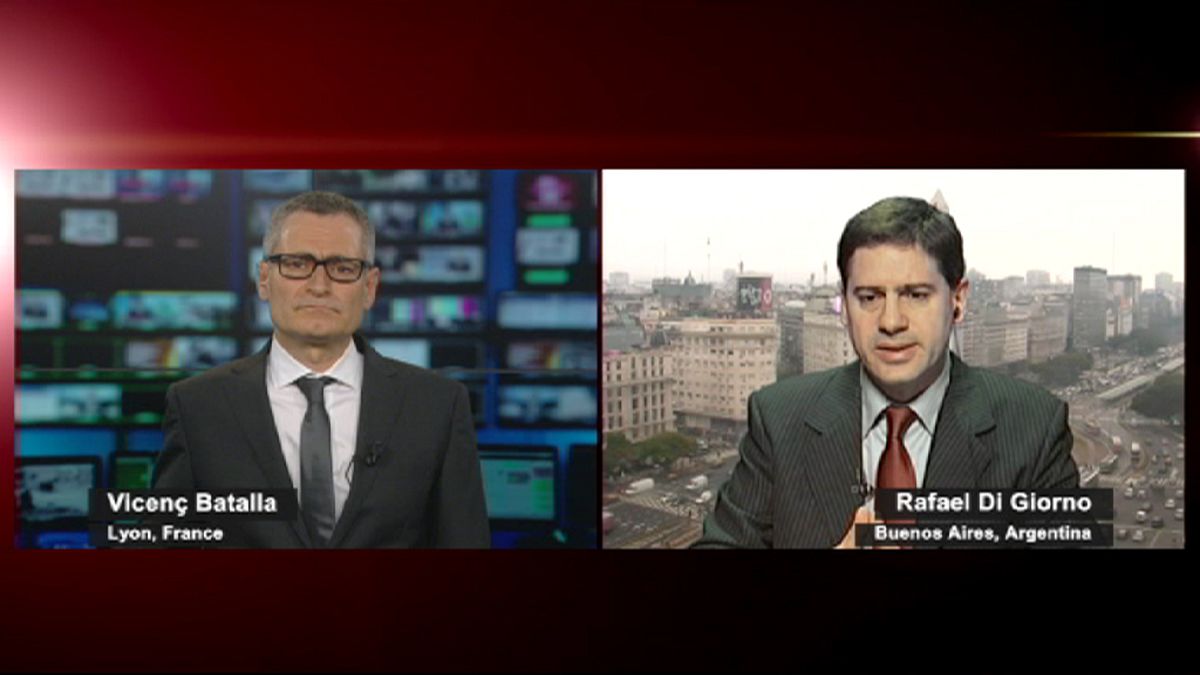With no last-minute deal Argentina is in technical default on repaying some of its debts, which sent supporters of President Cristina Fernández de Kirchner on to the streets to affirm the country does not negotiate with “vultures”, the term the government uses for the US investment hedge funds at the centre of this dispute.
The history: after Argentina went bankrupt 12 years ago it couldn’t repay the money it had borrowed, and so restructured its debt.
Most investors agreed to accept new bonds with reduced payments.
But the hedge funds that bought bonds later from the original owners – for much less than the face value – persuaded a US judge they should get all the interest originally due.
Last-ditch talks with those holdout creditors failed to reach an agreement which has a potentially big downside for Argentina.
The country is already in recession and that is likely to get worse.
Argentinian economic consulting firm Abeceb reckons the default will drag growth down by a further two percent, reducing GDP by 3.5 percent this year, and boost the unofficial inflation rate to 41 percent.
What it almost certainly won’t do is trigger the kind of mayhem seen following the crash 12 years ago.
Then, the economy collapsed after the biggest sovereign default in history, there was a deep recession, the currency was devalued, the authorities froze savers’ accounts to halt a run on the banks and dozens were killed in street protests.
This time the government is solvent, but there will be pain for the people and Argentina is again facing an uncertain financial future.
For more insight, euronews spoke to economist Rafael Di Giorno in Buenos Aires.
He works for Proficio Investment and is a former analyst with the Central Bank of Argentina and Deutsche Bank’s former vice president for Latin America.
euronews: “It’s not good news for Argentina; they didn’t reach an agreement with the US holdouts before the deadline expired. Although Argentina’s government says the country is not in default: what is the real situation?”
Rafael Di Giorno: “The reality is that the rating agencies are considering declaring a default because the bond holders, that’s those who accepted the restructuring of debt in 2005 and 2010, didn’t receive their interest payments. But this is not a ‘typical’ default, given that Argentina can pay. This money was actually sent to the banks, to Bank of New York Mellon, in Buenos Aires, but a court in New York is blocking the payment.”
euronews: “There are reports that Argentine private banks will in the end buy the Argentinian bonds from the US holdouts. Is this a plan that has government backing or are they acting independently?”
Rafael Di Giorno: “Officially the government can’t, in principle, hold talks with the holdouts, the hedge funds. Therefore, it is careful not to appear to have a role in these negotiations. This looks like a private initiative, from ADEBA (the Argentinian Banks Association), which represents the interests of private financial entities in the country. They tried to reach an agreement with the holdout bond holders, proposing to put money aside until the end of the year, which is when a clause that prevents the government from negotiating is due to expire. At that time Argentina would be able to negotiate directly with the holdouts.”
euronews: “Will investors now flee Argentina? Will the recession get worse and the people suffer as they did after the default of 2001?”
Rafael Di Giorno: “Not at all, the 2001 default was a very serious situation for many other reasons. At that time Argentina’s GDP fell around 11%. A brutal fall. This year all the projections indicate a recession, but around one or two percent. This is much more a ‘technical default’. Argentina can pay, but there’s a legal problem that is blocking the payments. It’s true that the 2001 default needs to be completely sorted out in order to move forward. But there will not be a massive flight of capital. In fact, in recent years there has not been so much capital inflow. Yes, there will be problems in financing big projects like the one at Vaca Muerta, where the oil company YPF has a big project and it will need external capital.”
euronews: “Does that mean there will not be problems in the US or Europe because of the Argentinian situation?”
Rafael Di Giorno: “No, I believe there won’t be contagion to other countries because it’s not a ‘default’, in the sense of a balance of payments crisis, or that the country has no dollars in its reserves. Certainly, that would have a impact on the currency. But I don’t think that is the case here.”


